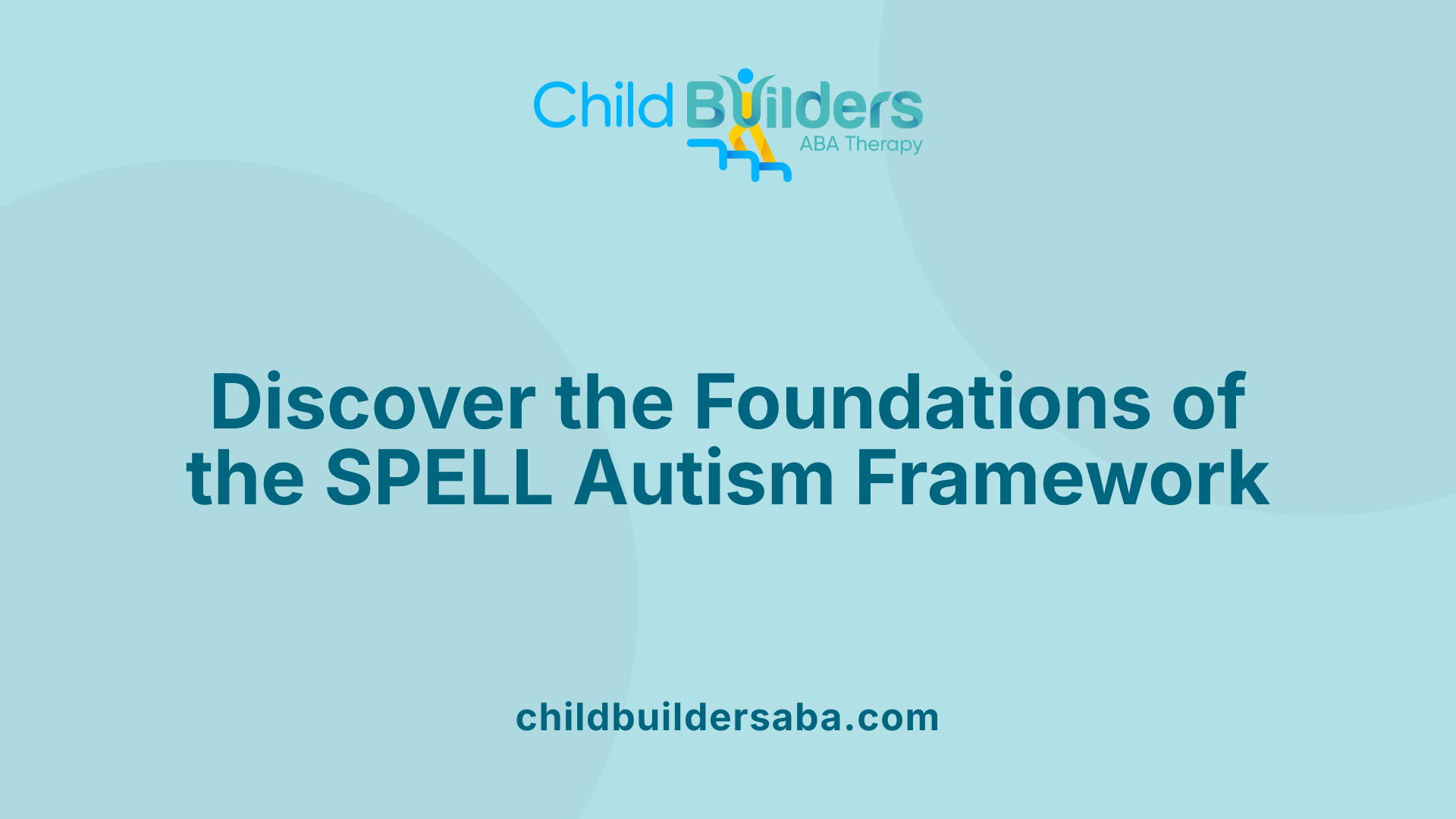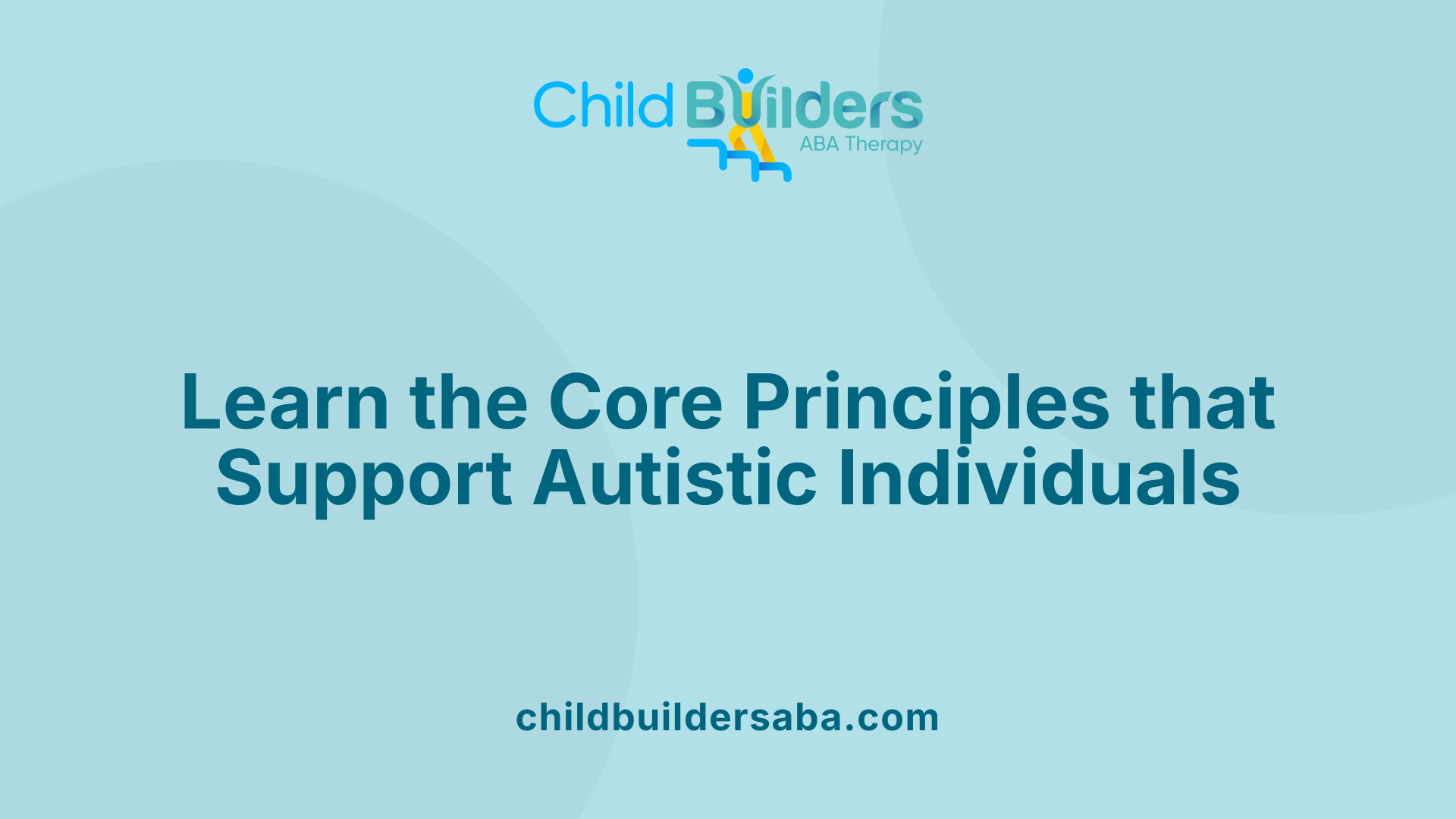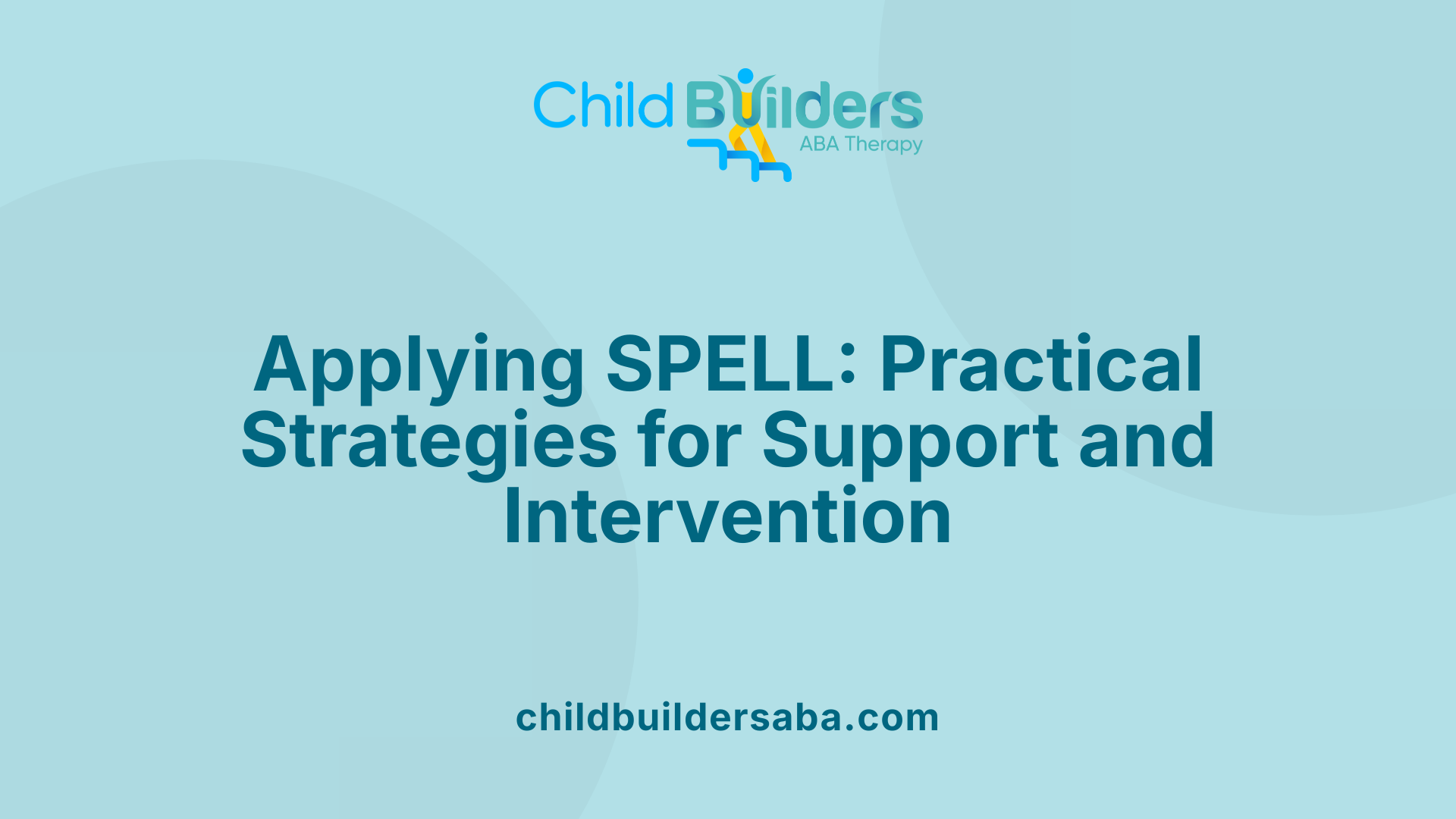SPELL Autism Framework

Understanding the Principles Driving Effective Autism Support
The SPELL Autism Framework, developed by the National Autistic Society, offers a comprehensive, evidence-based approach to understanding and supporting individuals on the autism spectrum. This article delves into the core principles of the framework, how it is applied in real-world settings, the resources available for practitioners, and the tangible benefits it provides to autistic individuals.
What is the SPELL Autism Framework?
 The SPELL Autism Framework is a comprehensive model developed by the National Autistic Society to guide the support and understanding of autistic children and adults. It aims to create environments and approaches that meet individual needs, fostering positive experiences and promoting independence.
The SPELL Autism Framework is a comprehensive model developed by the National Autistic Society to guide the support and understanding of autistic children and adults. It aims to create environments and approaches that meet individual needs, fostering positive experiences and promoting independence.
At its core, SPELL revolves around five fundamental principles:
- Structure: This involves designing predictable and accessible environments using visual cues, visual timetables, and choices to help reduce anxiety and support autonomy.
- Positive Approaches and Expectations: The framework encourages setting high, realistic goals based on individual assessments. Positive reinforcement, rewards, and celebrating strengths help build confidence.
- Empathy: Understanding and respecting the feelings, perspectives, and experiences of autistic individuals are crucial. This fosters trust, improves communication, and nurtures supportive relationships.
- Low Arousal: To minimize stress and sensory overload, environments are kept calm and quiet. Techniques include limiting noise, bright lights, and odors, and introducing calming stimuli like soft music or gentle massages.
- Links: Cooperation and information sharing among caregivers, professionals, families, and communities ensure consistency and strengthen support networks, promoting overall well-being.
The framework’s foundation is person-centered, emphasizing that support should be tailored to each individual’s strengths, preferences, and needs. It encourages collaborative planning and a holistic approach, ensuring that services respect dignity and foster self-esteem.
Using SPELL involves training professionals to understand and apply its principles effectively. Its evidence-based approach supports a range of interventions, aiming to create positive, supportive environments that empower autistic individuals to thrive.
Core Principles of the SPELL Autism Framework

What are the core principles of the SPELL Autism Framework?
The SPELL Autism Framework is built around five main principles that help create supportive environments for autistic individuals of all ages. These principles are Structure, Positive approaches and expectations, Empathy, Low arousal, and Links. Each plays a vital role in ensuring that autistic children and adults are understood, respected, and supported effectively.
Structure: Creating Predictable Environments
Structure focuses on designing environments that are organized and predictable. This includes using visual cues like schedules and visual aids, offering choices, and creating spaces that are accessible and calm. Such environments help reduce uncertainty and anxiety, building confidence and independence.
Positive Approaches and Expectations: Building Self-Esteem
This principle emphasizes setting high yet realistic expectations based on comprehensive assessments of each individual. It encourages using positive reinforcement, rewards, and focusing on strengths, interests, and abilities. The goal is to boost self-esteem and motivate individuals to develop new skills and participate fully.
Empathy: Understanding Perspectives and Feelings
Empathy involves actively understanding and respecting an autistic person’s feelings, perspectives, and sensory sensitivities. It promotes calm, sensitive interactions and supports positive relationships. Recognizing how someone experiences the world allows caregivers and professionals to respond appropriately and supportively.
Low Arousal: Creating Calm and Sensory-Friendly Spaces
Low arousal focuses on minimizing sensory overload and providing calming environments. This includes reducing noise, bright lights, and strong odors, while using acceptable sensory stimuli like soft music or gentle massage. Maintaining a calm atmosphere helps prevent anxiety and promotes emotional regulation.
Links: Building Partnerships and Sharing Information
Links refer to establishing strong collaboration among families, caregivers, professionals, and the autistic individual. Sharing consistent information, strategies, and support helps ensure a holistic approach. Building these relationships encourages participation, promotes independence, and supports community inclusion.
How Each Principle Supports Autistic Individuals
Together, these principles create a comprehensive approach to support autistic individuals by reducing anxiety, fostering independence, enhancing communication, and promoting dignity and respect. Environments based on structure and calmness help manage sensory sensitivities, while positive expectations and empathy encourage growth and confidence.
By working collaboratively and sharing information, caregivers can develop tailored strategies that respect individual needs and promote well-being. The SPELL framework aims to be universally applicable, fostering understanding and positive development across all ages and support needs.
Application of the SPELL Framework in Support and Intervention

How can the SPELL Autism Framework be applied in support and intervention?
The SPELL framework, developed by the National Autistic Society, provides a comprehensive approach to supporting autistic individuals across all ages and levels of support needs. The framework’s principles are centered on creating supportive environments and fostering positive relationships.
One of the core elements is establishing structured, predictable environments. Practitioners can use visual tools such as visual timetables and clear cues to make daily routines understandable and reduce uncertainty. Modifying surroundings to minimize sensory overload—like controlling noise levels, lighting, and odors—helps maintain a calm, low-arousal environment that mitigates anxiety.
Supporting independence and confidence is another vital aspect. This can be achieved by setting high, realistic expectations based on individual assessments. Reward strategies and positive reinforcement build self-esteem by highlighting strengths and interests. For example, offering choices and encouraging self-directed activities promote autonomy.
The framework stresses the importance of empathy—actively understanding each person's unique perspective, triggers, and sensitivities. Responding with patience, respect, and sensitivity supports better communication and trust. Recognizing sensory preferences or sensitivities allows support providers to tailor activities and environments, reinforcing well-being.
Building strong links with families, caregivers, and professionals is essential. Sharing information, maintaining open communication, and fostering collaborative partnerships ensures consistency and holistic support. These connections empower individuals and facilitate a shared understanding of needs and goals.
In practice, applying the SPELL framework involves integrating these principles into daily routines, staff training, and individual planning. It emphasizes a person-centered approach that respects dignity and promotes positive development. Whether in educational settings, homes, or community programs, adopting SPELL principles helps create nurturing environments that enable autistic individuals to thrive, communicate effectively, and participate socially.
Training and Resources for Effective Implementation of SPELL

What training and educational resources are available for the SPELL Autism Framework?
The National Autistic Society offers a comprehensive range of training and resources to help professionals, caregivers, and organizations effectively implement the SPELL framework. These resources aim to deepen understanding of each of the five principles—Structure, Positive approaches, Empathy, Low arousal, and Links—and translate them into practical, supportive strategies.
Training is available in different formats to accommodate various needs. Participants can choose from online e-learning modules, which allow flexible learning at their own pace, or attend face-to-face training sessions for more interactive and hands-on experience. Additionally, bespoke programs are developed to meet the specific needs of organizations or educational settings.
A key element of the training offering is the three-day licensed user course, which is accredited and provides in-depth knowledge about the FRAME. This course often leads to Continuing Professional Development (CPD) certification, enhancing professional expertise. Some training programs also qualify attendees for postgraduate credits, supporting further career advancement.
Beyond introductory courses, there are specialized training options focused on particular areas such as supporting autistic women and girls, increasing awareness of neurodiversity, and developing in-house trainers via train-the-trainer schemes. These options are designed to build capacity within organizations, enabling them to sustain and expand their support for autistic individuals.
Overall, these diverse training resources help ensure the SPELL framework is applied consistently and effectively, fostering more inclusive and understanding environments for people on the autism spectrum.
How the Framework Benefits Autistic Individuals
Improvements in environment and support
The SPELL framework emphasizes creating structured and predictable environments through visual cues, visual timetables, and specific environmental modifications. These adjustments help reduce anxiety and sensory overload for autistic individuals. By designing calm and organized settings, the framework ensures that sensory stimuli like noise and bright lights are minimized, which can be overwhelming. Creating such environments fosters a sense of safety and stability, making it easier for autistic individuals to engage and learn.
Enhancement of confidence and independence
Positive approaches and high, realistic expectations form a core part of the SPELL framework. By focusing on individual strengths, interests, and abilities, it encourages building self-esteem and motivation. Strategies such as positive reinforcement and reward systems help individuals recognize their achievements, promoting confidence. Furthermore, by establishing clear routines, providing choices, and supporting autonomy, the framework aids in developing independence. This empowers autistic individuals to manage daily activities more effectively and boosts their sense of self-efficacy.
Promotion of inclusion and well-being
The framework advocates for strong links among caregivers, families, professionals, and the autistic individuals themselves. This collaboration ensures consistent support and promotes community participation. By understanding and respecting each person’s unique perspective through empathy, the framework fosters respectful relationships and effective communication. Additionally, creating low-arousal environments helps reduce stress and anxiety, contributing to overall well-being. Respecting individual needs and fostering positive relationships encourages meaningful inclusion both within families and wider communities.
| Aspect | Focus | Supporting Strategies |
|---|---|---|
| Environment & Support | Structured, predictable spaces | Visual cues, sensory adjustments, visual timetables |
| Confidence & Independence | Positive reinforcement, strengths-based approach | Personal achievements, autonomy, choice |
| Inclusion & Well-Being | Collaboration, empathy, low arousal | Good links with families and professionals, calm settings |
The SPELL framework aids in creating environments and support systems that respect individual needs while fostering growth, independence, and inclusion, ultimately improving quality of life for autistic individuals.
Fostering a Supportive Future for Autism Support
Adopting the principles of the SPELL Autism Framework is essential for creating environments and practices that respect and empower autistic individuals. Its holistic, person-centered approach ensures that support is tailored to individual strengths and needs, promoting independence, confidence, and well-being. Through ongoing training and collaboration, professionals and support networks can better serve the autism community, paving the way for a more inclusive and understanding society. With continued commitment to these principles, there is great potential to significantly improve life experiences for autistic children and adults alike.
References
- The SPELL framework - National Autistic Society
- The Five Aspects of the SPELL Autism Approach
- Supporting autistic people using the SPELL framework
- SPELL Framework - Integrated Treatment Services
- What is the SPELL Autism Framework? | SEND | Twinkl Inclusion
- SPELL Framework - Marlborough School
- The SPELL framework - National Autistic Society

























.jpg)











































































